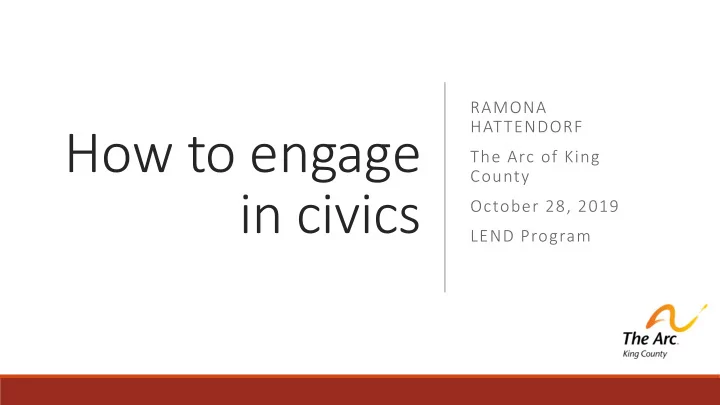

RAMONA HATTENDORF How to engage The Arc of King County in civics October 28, 2019 LEND Program
Bill signing, HB 1199 – Concerning healthcare for people with disabilities. Lifted the income cap to buy into Medicaid.
Look at the examples of public services. Check the 3 you most care about
Why would you want to vote and have a say in who is making decisions about Please write those services? down your answer.
I rely on these services I care about people who rely on these services I want others to know How did you what I care about respond? I worry supports won’t be funded …
Is voting your only power?
Voting is important. But it is not the only way to engage
HOW TO ENGAGE IN CIVICS…
Civic engagement Community Raising awareness & offering feedback Others to improve resources, supports, and policies that promote the public good Self
Who has power?
Legislative: Executive: Courts: passes laws carries out interpret the and votes on laws; runs laws the budget government
What is public policy? “Policy is about the people. Policy outlines our socially accepted norms and practices.” Policy: Comes from the Greek “polite,” which means citizenship; “politest” which means citizen; and from “polis” which means city “It’s our community; we have a say”
Public policy = Rules we agree to live by as a society. Policies that govern the public But ALSO … Public policy = Rules that the PUBLIC has an opportunity to influence
When should you try to influence public policy? POLICY IN MOTION
Influencing public policy Be informed • Coalitions and advocacy organizations track bills. Find your people and connect • If there is a bill, look it up. You can comment on it, follow it, watch hearings – all online www.leg.wa.gov • No bill, but have a concern? Ask for meeting!
Influencing public policy Share what you have to say • Formally: Testimony at a hearing; email; phone call • Informally: At a town hall or candidates forum; a post on social media
Influencing public policy You can be more effective if you know when and who to share with • Who is engaged? • Who has power over the legislation? https://app.leg.wa.gov/billsummary?BillNumb er=1199&Year=2019&Initiative=false
And they’re off … bill making 1. Bill is “read” and referred to committee 2. Chair decides if a bill will be heard. Not all will be heard (Public comment!) 3. Chair decides whether to call a vote. Not all will be voted on (Good bets: Mass appeal!)
And they’re off … bill making 4. Committee members offer and vote on amendments. (NO public comment) 5. Goes to Rules committee. Someone from Rules needs to “pull” the bill for it to go to the full chamber for consideration. Not all get pulled (Great time to have champions)
And they’re off … bill making 6. Goes to “floor” (full chamber). Leadership decides when/ whether to vote. Not all will be voted on (Great time to have champions) 7. MORE amendments, including “strikers” (Are there opponents behind the scenes?) Passes to the other chamber! Process repeats
Another way to influence … Join a citizens committee or advisory body. This is especially helpful if you want to help inform administrative rules or the executive branch
Petitions and mass alerts ➢ If there is a big response, mass alerts or petitions can show there is a constituency. They are a show of power. ➢ If you want your individual voice heard, then testify, call, or send a note. If you use an action alert, change the subject line and make sure what you uniquely have to say is on top
Who do you contact? Start with your representatives. Here is how to look them up. You can learn a lot about them (committees, bills sponsored, bio page, etc)
Who else? People with power over the process A committee chair – they decide what bills to hear and when/whether to call a vote. Other committee members. Other leadership
Get to know your elected reps Local and federal leaders – Any time. You probably will meet with staff. State leaders - When they aren’t in session. Attend coffees; go to town halls; go to LD meetings; attend candidate forums; connect on social media; subscribe to their newsletters
What to say? TOOLS TO HELP YOU ORGANIZE YOUR THOUGHTS
ADVOCACY DAYS 22 Jan. 29 Jan. 12 Feb. 20 Feb. 4 Mar. Disability Briefing & Community Families in Crisis, The Early Learning, Early Workforce Shortage, Legislative Reception Residential, The Arc of Arc of Washington & Learning Action The Arc of Washington Washington & DD DD Council Alliance & DD Council Council K-12 inclusion and Self-Advocates & Caseload Forecast DD special education, Employment Supports, Services, The Arc of Budget Overview, The Investing in Student The Arc of Washington Washington & DD Arc of Washington & DD Potential Coalition & DD Council Council Council 28 Jan. 5 Feb. 19 Feb. 26 Feb.
Recommend
More recommend